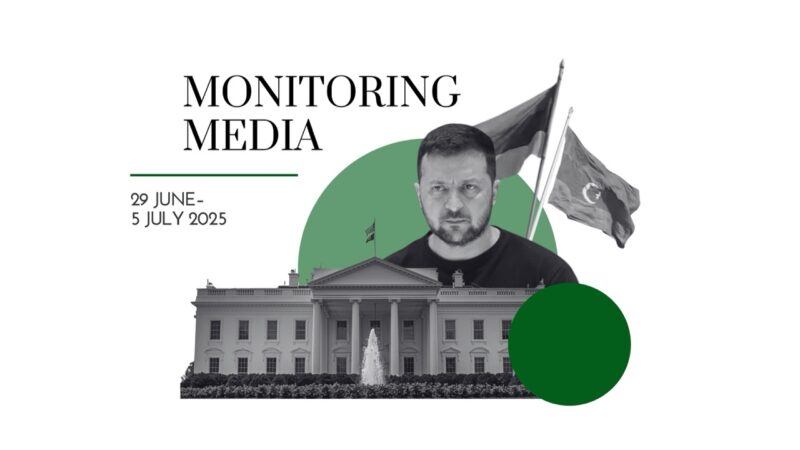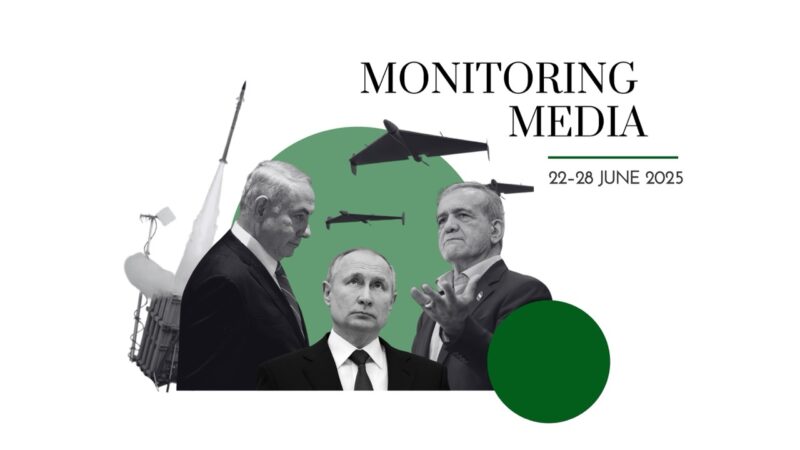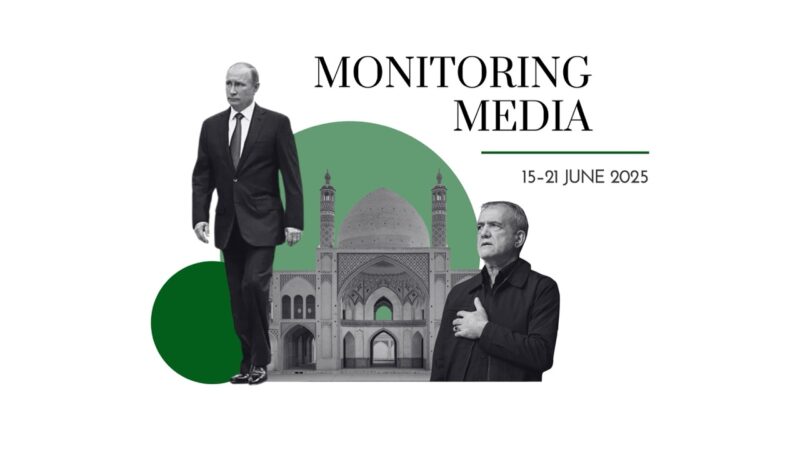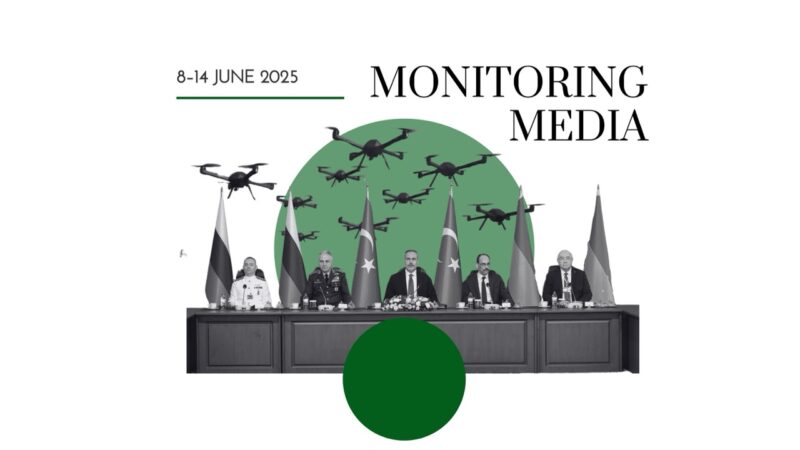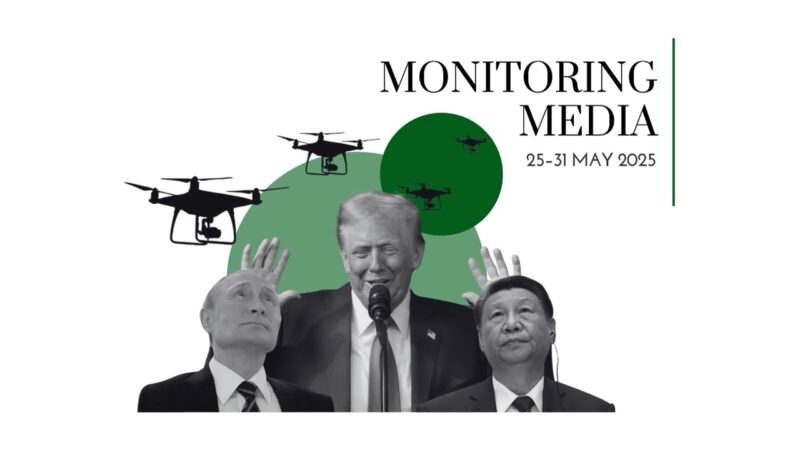Intimidation is the Kremlin’s official policy

CIUS weekly report on North American media coverage of Ukrainian affairs, 14–20 April 2024
Six publications (The Atlantic, The Washington Post, The National Interest, Foreign Affairs, National Post, and The Economist) were selected to prepare this report on how Ukraine has been portrayed in the North American press during the past week. The sample was compiled based on their impact on public opinion as well as on their professional reputation, popularity among the readership, and topical relevance. These publications represent centrist viewpoints on the political spectrum.
This MMS report covers only the most-read and relevant articles about Ukraine, as ranked by the respective North American publications themselves in the past week. Its scope covers promoted articles on home pages and articles from special sections on Ukraine, with the hashtag #Ukraine, from the paper editions of the publications, and about Ukraine from opinion columns and editorials.
Featured topics
- The world and Ukraine: US planes are protecting Israel but not Ukraine; Trump’s plan for Ukraine is preposterous; Ukraine’s war effort may soon be funded by redirected frozen Russian assets.
- Russia at war: Five future scenarios Russia could be faced with; Intimidation is the Kremlin’s official policy.
MMS summaries
Why did US planes protect Israel but not Ukraine? Anne Applebaum (Atlantic) argues that the recent attacks by Russia and Iran on Ukraine and Israel, respectively, can serve as a good lesson for other nations. European countries and the United States have jointly protected Israeli airspace from Iranian missiles and drones. Ukrainian skies, on the other hand, are defended by Ukrainians alone: “On April 12 Russian strikes badly damaged an energy facility in Dnipropetrovsk. On April 13, a 61-year-old woman and a 68-year-old man were killed by a Russian strike in Kharkiv. On April 14, an aerial bomb hit an apartment building in Ocheretyne, killing one and injuring two. On April 15, a Russian guided missile hit a school and killed at least two more people in the Kharkiv region.” Applebaum believes that differing reactions of Western allies to these attacks can be explained by two reasons. First, the difference lies in the balance of nuclear power: “Russia has nuclear weapons, and its propagandists periodically threaten to use them.” Israel also has nuclear weapons, but this affects the calculation in a different way: “It means that the U.S., Europe, and even some Arab states are eager to make sure that Israel is never provoked enough to use them, or indeed to use any serious conventional weapons, against Iran.” A second difference between the two conflicts is that the US establishment is immune to the propaganda of the Islamic Republic of Iran: “Leading Republicans do not sympathize with the mullahs, do not repeat their talking points, and do not seek to appease them when they make outrageous claims about other countries.” However, some leading US politicians are sympathetic to Russia and believe that Ukraine “should ‘shift to a defensive war,’ give up any hope of retaining its occupied territory, or else stop fighting altogether.” This divergence regarding the two conflicts highlights two key conclusions—first, that nuclear weapons make a state much safer: “Not only can you deter attacks with a nuclear shield, and not only can you attack other countries with comparative impunity, but you can also, under certain circumstances, expect others to join in your defense”; and second, a part of the US establishment “can be co-opted, lobbied, or purchased outright” and this is much cheaper than investing in armaments. According to Applebaum, “No doubt many will make use of both of these lessons in the future.”
Trump’s preposterous plan for Ukraine. Max Boot (Washington Post) emphasizes that Donald Trump’s plan for Ukraine is even more absurd than Richard Nixon’s plan for Vietnam. During the 1968 election campaign, Richard Nixon made a vague promise to “end the war and win the peace in the Pacific.” Later, it became clear that President Nixon’s strategy was to go “to Moscow and Beijing to win over North Vietnam’s principal allies, while dropping hints that he was a ‘madman’ who was willing to use nuclear weapons if Hanoi did not stop fighting.” To show Nixon was serious, he intensified the bombing of North Vietnam and invaded Cambodia. However, none of the POTUS’s steps brought “peace with honor” any closer: “In 1973, he signed a peace treaty that pulled all remaining US forces out of South Vietnam but allowed North Vietnam to keep between 140,000 and 300,000 of its own troops in the south. A little more than two years later, North Vietnam conquered South Vietnam.” In the author’s opinion, Donald Trump’s plan to end Russia’s war against Ukraine in 24 hours is equally unrealistic. Moreover, the steps announced by Viktor Orban as part of Trump’s plan could have extremely negative consequences for the US and its allies in Europe. According to Boot, Trump “seems to have fallen for Russian propaganda—which is prevalent on the MAGA right—suggesting that the war in Ukraine is a minor border dispute that can be easily resolved by handing over to Moscow the Russian-speaking regions it covets: Crimea and the Donbas.” Even if we leave aside the question of the morality of sacrificing the territory of a partner country in favour of an aggressor, there is no evidence that Vladimir Putin will be satisfied with this and will refrain from further expansion: “Dmitry Medvedev, Russia’s former president who is now the deputy chairman of its Security Council, last month unveiled Moscow’s own ‘peace plan,’ which calls for the unconditional surrender of Ukraine and its absorption into Russia. The Russian Orthodox Church, which is a handmaiden of the Putin regime, has declared the conflict in Ukraine a ‘holy war.’” According to the author, “Trump’s defeatist ‘peace plan’ will only convince Putin that victory is within his grasp. Given Trump’s long record of revering Putin and reviling Ukraine, a Russian victory might be precisely the outcome Trump is seeking to achieve.”
Five future scenarios Russia could face. Stephen Kotkin (Foreign Affairs) writes that there are five potential scenarios for Russia’s future. Even though Vladimir Putin and his entourage position the Kremlin leader as a new tsar, he is not. After all, a true tsar should not be worried “about a looming succession crisis and what it might do to his grip on power in the present.” Vladimir Putin is no match for Joseph Stalin, but the latter has a lesson for the current ruler of the Kremlin: “Stalin’s system proved unable to survive without him, despite having an institutionalized ruling party.” Today, both Putin and Russia are already facing the question of their future. Western officials should not exaggerate their ability to shape Russia’s development trajectory and be prepared for any future developments. According to the author, there are five key scenarios for Russia after Putin. First, Russia can follow the experience of France and go through a transformation from monarchical state with a rigid bureaucratic system to a modern republic with democratic governance: “If Russia were to become like France—a democracy with a rule-of-law system that luxuriated in its absolutist and revolutionary past but no longer threatened its neighbors—that would constitute a high-order achievement.” However, the probability of this occurring is low. After all, despite similarities in the desire for centralization, France has deeply rooted democratic practices and traditions. Second, Russia could maintain the current status quo. While some Russians may welcome such a transformation of Russia, as was the case with France, others would consider this outcome to be a betrayal: “What the world now sees as Putinism first surfaced in the Russian-language periodicals and volunteer societies of the 1970s: an authoritarian, resentful, mystical nationalism grounded in anti-Westernism, espousing nominally traditional values and borrowing incoherently from Slavophilism, Eurasianism, and Eastern Orthodoxy.” Third, Russia could become a vassal of China. Its war against Ukraine is making Russia increasingly dependent on China: “Officially, trade between Russia and China surpassed $230 billion in 2023; adjusting for inflation, it had hovered around $16 billion three decades earlier and stood at just $78 billion as recently as the mid-2010s.” The key question is whether Beijing wants to become the overlord of a problematic vassal state and bear responsibility for its actions. Fourth, Russia might follow the destiny of North Korea. Despite significant differences between Moscow and Pyongyang, “Russia could become something of a gigantic North Korea: domestically repressive, internationally isolated and transgressive, armed with nuclear weapons, and abjectly dependent on China but still able to buck Beijing.” Fifth, Russia could slide into chaos: “Putin’s regime wields the threat of chaos and the unknown to ward off internal challenges and change. But while keenly sowing chaos abroad, from eastern Europe to central Africa and the Middle East, Russia itself could fall victim to it.” According to Kotkin, “Russia’s future forks: one path is a risky drift into a deeper Chinese embrace, the other an against-the-odds return to Europe. Having its cake and eating it, too—enduring as a great power with recaptured economic dynamism, avoiding sweeping concessions to the West or lasting subservience to China, dominating Eurasia, and instituting a world order safe for authoritarianism and predation—would require reversals beyond Russia’s ability to engineer.”
Intimidation is the Kremlin’s official policy. Thomas Kent (National Interest) is convinced that Russia’s claimed intention to replace the rules-based international order with a “fairer system for all” is a delusion. Instead, Moscow’s day-to-day behaviour indicates its desire to establish a system without rules, where “right is determined simply by muscle and the nerve to use it.” During its full-scale invasion of Ukraine, Russia first distanced itself from the international community. Since that time, hostility and violence became established as the prevailing form of strategic communication for Putin’s regime: “The Kremlin seems to be spending less time justifying itself and more openly intimidating its opponents at home and abroad.” This behaviour seems to be supported by many Russians, “who have been told for decades that Russian President Vladimir Putin is restoring their country’s status as a superpower. They may feel that it is better for Russia to be strong and feared than to seek accommodation with what they see as an immoral and predatory West.” The main target of Russia’s intimidation policy remains Ukraine, whose civilian infrastructure is being systematically destroyed. In the occupied territories of Ukraine, Russian troops systematically commit violence against residents: they “do not try to hide their brutal torture chambers, kidnapping of children, and summary executions from local residents.” But Russia is not confining itself to Ukraine—it is increasingly emboldened to commit violence in other states as well, including poisoning Sergei Skripal and his daughter in the UK, murdering a Chechen dissident in Berlin, and so on. Violence is also tolerated within Russia. Increasingly, “war opponents, political dissidents, and LGBT persons have been accused of crimes related to terrorism and extremism. This equates their deeds in the public mind with those who perpetrate mass violence and may suggest that they are worthy of equal punishment.” According to Kent, “Western countries will also need to decide if they can continue to accept Russian brutality at home and abroad. If so, other authoritarian regimes will invariably see it as a model of what they can do—and get away with.”
Ukraine balances defence needs, civilian stability amidst the war. Nataliya Gumenyuk (Foreign Affairs) highlights Ukraine’s ongoing struggle to bolster its defences against Russia while simultaneously navigating the complex challenges of maintaining civilian life and economic stability. Amidst a protracted conflict, Ukraine is grappling with the urgent need for soldiers, facing dilemmas such as maintaining troop quality and managing the enlistment of experienced veterans while addressing constitutional concerns about conscription. President Zelensky’s interim measures, such as lowering the military mobilization age and implementing a draft registration system, aim to address these challenges, yet the path forward remains fraught with complexities. Admitting that there are “no perfect solutions,” the author also sheds light on Ukraine’s efforts to revitalise its defence industry and secure international support for critical weaponry. While depending on allies for sophisticated weapons, Ukraine also seeks to enhance its own defence capabilities, balancing the need for increased defence spending with preserving economic stability and democratic values. The country’s ongoing innovations in defence technology, such as unmanned vehicles and IT solutions, underscore its adaptability in the face of evolving threats. As former Defense Minister Andriy Zagorodnyuk emphasizes, Ukraine’s goal is not only to reclaim territory but also to dismantle Russia’s capabilities for future aggression. Gumenyuk underscores that despite facing daunting obstacles, Ukraine is showing determination to defend itself and innovate in the face of adversity. As the war evolves, Kyiv’s ability to navigate these complexities will be crucial in shaping its future trajectory.
Ukraine’s struggles impact Israel’s security. Adam Zivo (National Post) opines that the recent drone and missile attack on Israel by Iran is a direct consequence of the West’s failure to decisively address Russian aggression in Ukraine. Zivo contends that the struggles of Ukraine and Israel are closely linked within the context of a new Cold War, where global conflicts are intertwined and adversaries like Russia, Iran, China, and North Korea are increasingly collaborating to advance their shared interests. Zivo highlights the symbiotic relationships among these adversarial powers, pointing out their coordination and aggression in pursuit of collective goals. He criticizes the West for its perceived indecisiveness and lack of solidarity in responding to Russian expansionism—which, he argues, emboldened Iran to attack Israel. “Iran’s drone and missile attack on Israel on Saturday would not have happened had the West shown more resolve against Russia over the past two years. Our indecisiveness in Eastern Europe signalled to our enemies that we are weak and divided—so is it any surprise that they are now trying to exploit this to their advantage?” Zivo asserts that Israel’s alignment with Russia (as the country’s leaders believed that Moscow’s military presence in the Middle East could temper Islamist violence) further exacerbated the situation, revealing Russia’s support for Hamas and refusal to condemn Iran’s actions. The author also emphasizes the necessity for the West, particularly the United States and Israel, to demonstrate strength and solidarity in deterring aggression from adversaries like Iran. He suggests that a strong response is essential—including providing more arms to Ukraine—to deter further attacks and protect Western interests. Zivo concludes that only by showing strength and unity can the West effectively maintain peace and stability.
Ukraine’s war effort may soon be funded by frozen Russian assets. Editorial analysis by The Economist focuses on the case of Russia’s recent destruction of a key hydroelectric power plant in Trypillia near Kyiv, which highlights two critical shortages faced by Ukraine: a lack of anti-missile ammunition and a desperate need for financial support. While the shortage of ammunition is exacerbated by Ukraine’s limited industrial capacity, the real shortage of funds reflects a limited political will among Ukraine’s allies. However, there are signs of progress in an idea to utilize interest income from frozen Russian assets to benefit Ukraine, as articulated by America’s deputy national security adviser for international economics, Daleep Singh, who said that “the Biden administration now wanted to make use of interest income on frozen Russian assets in order to ‘maximise the impact of these revenues, both current and future, for the benefit of Ukraine today.’” The proposed approach involves seizing income earned on Russia’s foreign holdings, which is seen as both legal and practical, according to the authors. This strategy entails transferring the net present value of the income stream to Ukraine, potentially yielding significant financial assistance. Despite some European scepticism and concerns about legal obstacles, there is growing support for this idea. The Economist’s suggestion to invest Russian cash holdings into five-year German bonds could provide a substantial annual yield, offering a solution to Ukraine’s financial woes. While the European Union has agreed to seize profits from depositories, further steps to transfer funds to Ukraine are hindered by scrutiny and hesitancy. A significant influx of cash, as proposed by the US, would unquestionably greatly ameliorate Ukraine’s situation. Therefore, European politicians are urged to embrace the proposal to unlock additional financial resources for Ukraine before potential changes in leadership occur.
Canadian reporting
How one Canadian newspaper effectively challenges Putin’s regime through irony, humour. Tom Blackwell (National Post) highlights the significance of the Nasha Kanada (Our Canada) newspaper as a counterforce against Russian media propaganda that are accessible in Canada. “Nasha Kanada appears unique by routinely poking the Putin bear,” as per author’s description.
The publication, known for its satirical take on Russian leader Vladimir Putin and his regime, has faced backlash, including harassment allegedly orchestrated by the Kremlin. Blackwell underscores the uniqueness of Nasha Kanada’s approach in directly challenging Putin—contrasting it with other Russian-speaking media in Canada that often refrain from outright criticism. The author emphasises the role of humour in Nasha Kanada’s approach as a powerful tool against authoritarianism. He quotes Marcus Kolga, head of the DisinfoWatch group, who says: “Humour is seen as one of the most effective ways to challenge authoritarianism.”
The author also highlights the challenges faced by individuals like journalist Alla Kadysh, who has experienced abuse for voicing anti-Kremlin opinions. Despite facing harassment and threats, Nasha Kanada continues its critical stance, using irony and satire to engage its audience and challenge Russian propaganda in Canada. Despite the newspaper’s print circulation being modest, around 20,000 copies, its online edition has garnered a substantial following. After its departure from Facebook, the publication migrated to X (former Twitter), amassing 102,000 followers and approximately 15 million impressions monthly.
Through humour and satire, Blackwell writes, Nasha Kanada not only challenges authoritarianism but also navigates the complexities within Canada’s Russian-speaking community, where apparently support for Putin remains significant. According to the 2021 census, nearly 550,000 Canadians have ethnic Russian origins, Blackwell notes. Some estimates suggest that around one-third of this demographic still engages with the Russia Today television network and other media platforms associated with or permitted by the Kremlin, despite them being discontinued by Canadian cable companies. These outlets are known for perpetuating “a regular incitement to hatred against Ukrainians,” according to Kolga.
